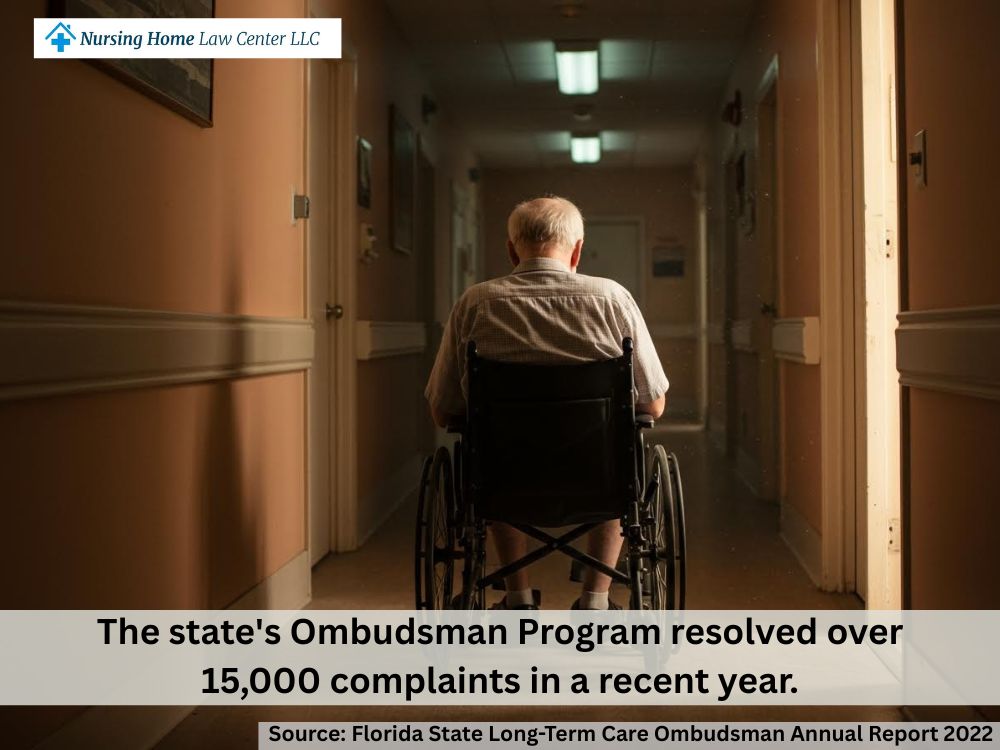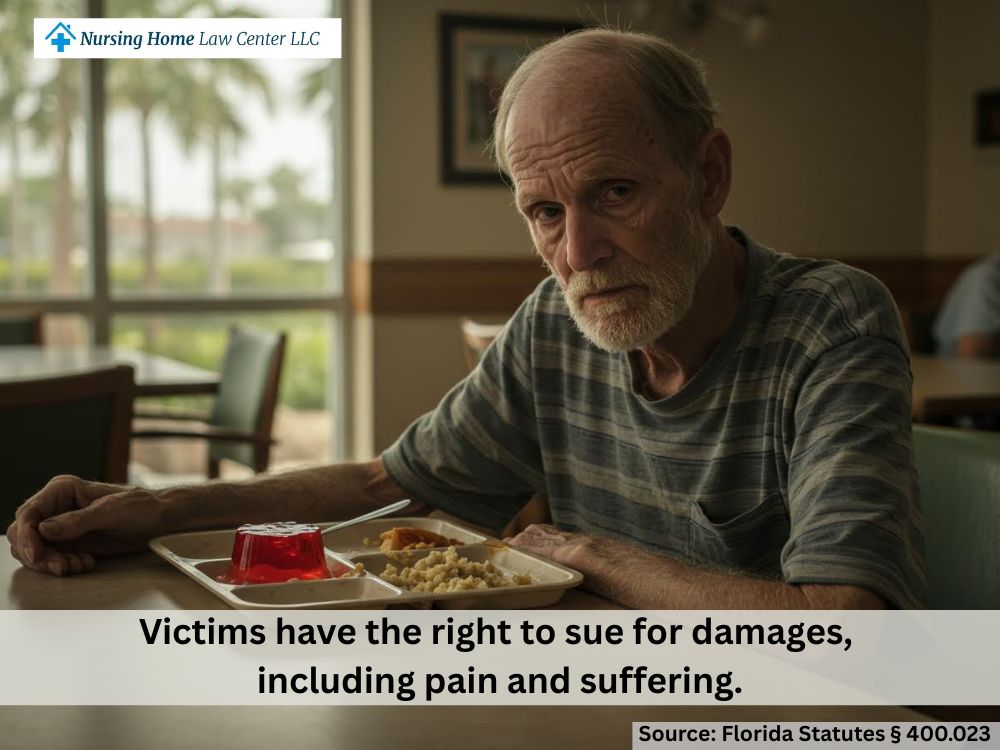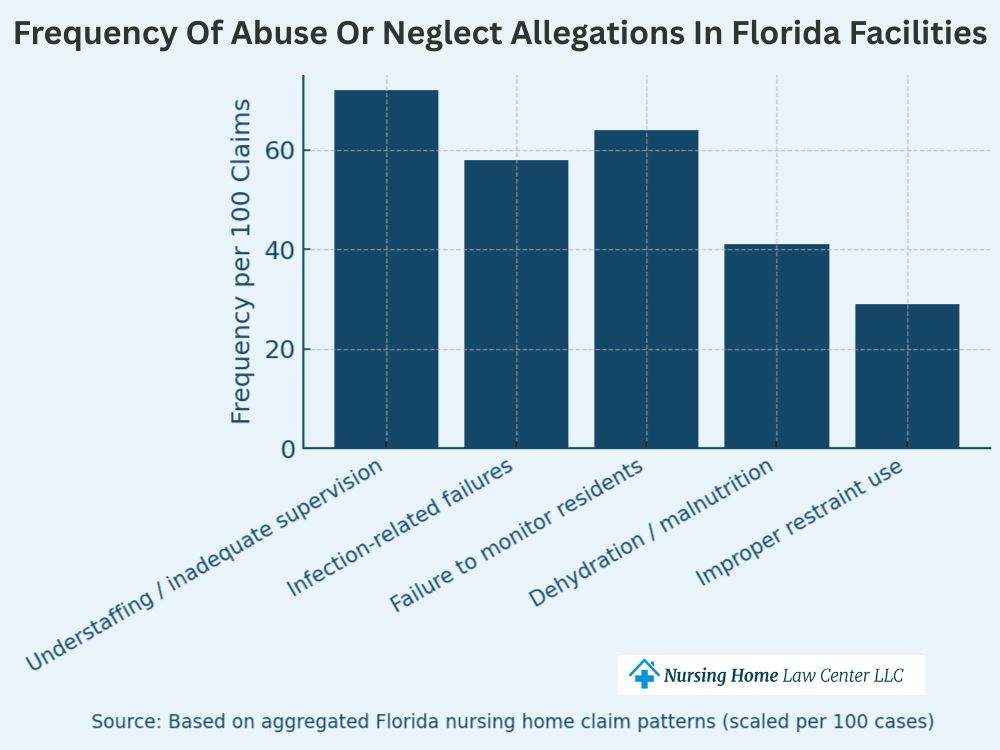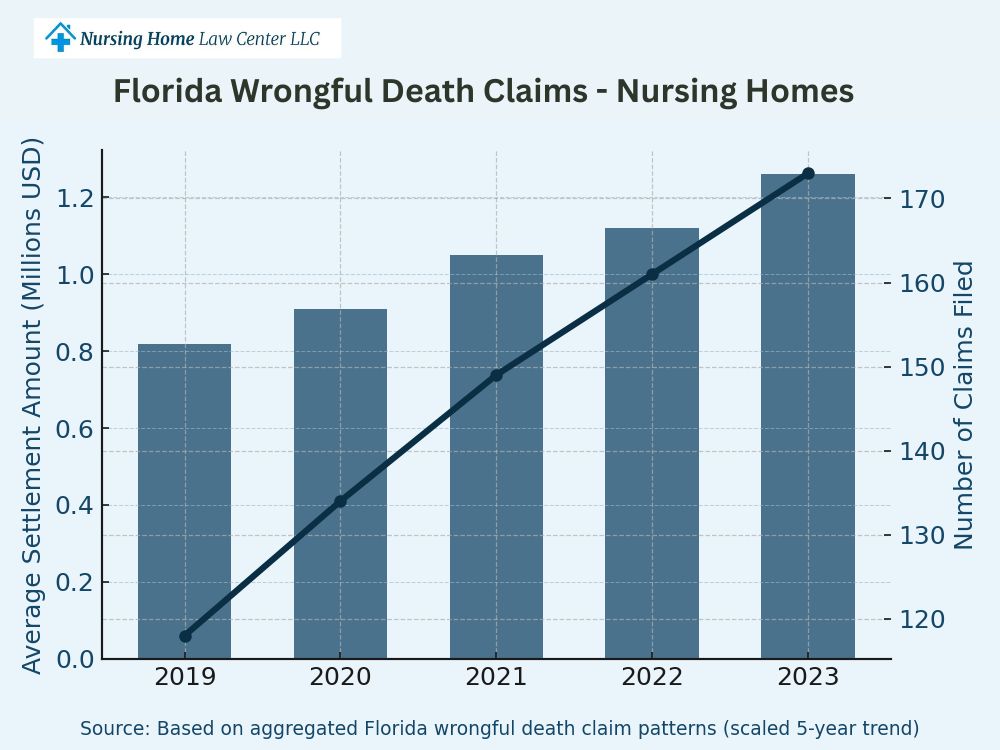The Nursing Home Law Center is committed to providing the legal resources necessary to hold negligent facilities accountable.
Florida Nursing Home Abuse Lawsuit Settlements
When a loved one suffers mistreatment in a nursing facility, the impact on your family can be devastating. At Nursing Home Law Center, we help families pursue Florida nursing home abuse lawsuit settlements to hold negligent facilities accountable and secure the financial support victims deserve.
With years of focused experience in nursing home litigation, our firm understands the laws that protect residents in nursing homes and the legal strategies that lead to real results. If your loved one has suffered abuse or neglect in a Florida nursing home, assisted living facility, or long-term care center, our experienced attorneys are ready to help.
We believe in your case and in your right to seek justice through the legal process. You don’t have to face this alone. Let us help you move forward.

Settlement and Verdicts Recovered by Our Nursing Home Abuse Lawyers
Our Florida nursing home abuse lawyers have decades of combined experience representing nursing home abuse victims and their families across the state, with a strong track record of holding negligent facilities accountable through legal action and meaningful settlements.
- $2,150,000 Settlement – Mary, an 82-year-old nursing home patient in Sarasota, developed stage IV bed soresthat became infected and led to fatal sepsis. Records from the Florida Agency for Health Care Administration revealed repeated violations for inadequate wound care and understaffing. Her family pursued a wrongful death lawsuit against the facility. Substantial evidence, expert medical opinions, and documentation of the facility’s failure to act resulted in a nursing home abuse settlement following the woman’s death.
- $1,700,000 Settlement – Thomas, a resident in a Tallahassee nursing facility, fell while trying to walk unassisted to the restroom. He suffered a hip fracture and subdural hematoma. His care plan clearly stated he required two-person assistance, but staff failed to respond to his call light for nearly 30 minutes. Medical records and staff logs helped strengthen the nursing home abuse lawsuit.
- $1,200,000 Settlement – Jasmine, a 59-year-old woman with disabilities, was injured in a transport van operated by a nursing home in Fort Lauderdale. The driver took a sharp turn without securing her wheelchair, causing her to strike her head and suffer lasting back and shoulder injuries. The lawsuit cited negligence and lack of staff training. Witness statements and medical evaluations supported her case, resulting in a nursing home lawsuit settlement.
- $735,000 Settlement – Eleanor, a 76-year-old nursing home resident in St. Petersburg, fell from an unattended wheelchair that had been left without brakes during a shift change. She broke her leg and sustained compression fractures in both her lumbar and cervical spine. Video footage and incident reports revealed apparent staff negligence. Our nursing home abuse lawyers secured a nursing home abuse settlement to cover medical expenses, rehabilitation costs, and emotional distress from the fall.
What Types of Financial Compensation Can Be Recovered Through a Nursing Home Abuse Settlement?
When a nursing home resident suffers abuse or neglect, the financial impact on the victim and their family can be significant. A nursing home abuse settlement helps cover these losses and provides support for recovery and future care.
Depending on the circumstances, families may be entitled to compensation for both economic and non-economic damages, including medical bills, emotional distress, and relocation costs.
Medical Bills
Victims of nursing home abuse often require emergency care, hospitalization, surgery, or ongoing medical treatment as a result of the harm they suffered. A nursing home abuse settlement can help cover both current and future medical expenses, including physical therapy, medications, and rehabilitation costs.
These costs are documented through treatment records and are often a significant factor in the final settlement amount.
Emotional Distress
Nursing home abuse can cause lasting psychological harm. Victims may experience anxiety, depression, or emotional trauma after suffering abuse, especially in cases involving emotional or physical abuse. A nursing home abuse settlement often includes compensation for the emotional pain and suffering endured, recognizing the profound personal impact beyond physical injuries.
Relocation Costs
If a resident has been abused, moving them to a safer facility is often necessary. Relocation may involve transportation, intake fees at a new nursing home or assisted living facility, and added costs for upgraded care. These expenses can be included in a nursing home abuse settlement to ease the financial burden of securing a safer, more appropriate care environment.

What Is the Average Settlement for Nursing Home Abuse in Florida?
According to Law.com’s VerdictSearch, the average settlement or award is approximately $55 million, though a few extremely high-value verdicts heavily skew this figure.
A more reliable indicator in most cases is the median value, which stands at $1,514,615. The range spans from $50,000 to over $1.1 billion, reflecting the broad spectrum of case types–from individual neglect claims to large-scale corporate negligence.
Several factors can significantly affect the final settlement amount:
- Severity of the victim’s injuries (e.g., head trauma, broken bones, sepsis)
- Medical treatment expenses and ongoing care needs
- Evidence presented, including treatment records and witness testimony
- Facility history of violations or prior complaints
- Emotional trauma for an extended period
- Wrongful death claims involving funeral costs and loss to the family
- Jurisdiction and venue, with Palm Beach County being the most common in Florida nursing home abuse cases
Each nursing home lawsuit is fact-specific, and working with experienced nursing home neglect lawyers can help ensure the settlement amount reflects the full scope of the harm.
Example Nursing Home Lawsuit Settlements and Verdicts
$900 Million Verdict for Gainesville Man’s Neglect and Amputation
Joseph Webb, a Gainesville nursing home resident paralyzed from a stroke, developed infected bedsores that led to a leg amputation after years of neglect and lack of medical supplies. Evidence showed chronic understaffing and cost-cutting by corporate owners. Experts testified that Webb’s suffering and loss of quality of life were preventable.
A Florida jury awarded $900 million—$200 million in compensatory and $700 million in punitive damages—finding the nursing home’s failure to provide adequate care caused severe harm and violated Florida’s resident rights statutes.
$200 Million Award for Fatal Wheelchair Fall at Pinellas Park Facility
Elvira Nunziata, 92, died after falling down a stairwell while strapped into her wheelchair at a Pinellas Park nursing home. Staff knew she had dementia and a tendency to wander, but failed to secure alarms or monitor her safety. Testimony revealed chronic understaffing and neglect.
A jury awarded $200 million, including $140 million in punitive damages, to punish the facility’s disregard for resident well-being. Her son, Richard Nunziata, received $50 million for emotional pain and loss of parental guidance.
$17,044,814 Judgment for Neglect Leading to Death from Sepsis
Seventy-eight-year-old Hildegard Martin entered Carehouse at Hallandale Beach for short-term rehabilitation after hip surgery, but endured extreme neglect. She developed gangrenous bedsores, malnutrition, and dehydration before dying from sepsis. The facility ignored her basic hygiene and medical needs, and staff tried to prevent her daughter from reporting the abuse.
The jury found gross negligence and awarded $17,044,814, including $15 million in punitive damages, holding the nursing home and its corporate owners accountable for her pain, suffering, and death.
$12,353,604 Award for Stage-4 Bedsore at Orlando Rehabilitation Center
Carol Reed, 67, developed a stage-4 bedsore while recovering from a leg fracture at Life Care Center of Orlando after staff stopped repositioning her as directed by doctors. The wound worsened, requiring multiple surgeries, extended hospital stays, and years of wound care. Evidence showed staffing shortages and poor documentation.
The jury found the facility 87 percent responsible, awarding $12,353,604 for medical costs and pain and suffering. Reed’s net recovery was $10.7 million after a comparative negligence reduction.

What Types of Elder Abuse or Neglect Can Be Grounds for a Nursing Home Lawsuit?
Elder abuse in a nursing facility can take many forms, and each may serve as legal grounds for filing a nursing home abuse lawsuit. An experienced nursing home neglect lawyer can help investigate these cases and seek accountability for the harm the victim suffered.
Physical Abuse
Physical abuse involves any use of force that causes injury or pain to a resident. This includes hitting, shoving, rough handling, unnecessary restraints, or forceful repositioning. Signs may include bruises, fractures, or unexplained injuries.
Medical records, photographs, and witness statements often support nursing home abuse cases involving physical violence. These incidents are not only grounds for a nursing home lawsuit but may also prompt criminal investigations or state-level facility reviews.
Emotional Abuse
Emotional abuse can leave deep, lasting harm. It may involve verbal insults, humiliation, intimidation, isolation, or threats. Residents subjected to this treatment may become withdrawn, anxious, or fearful around certain staff.
Although less visible than physical injuries, emotional abuse is just as severe and can justify a nursing home abuse lawsuit. Expert evaluations, behavioral changes, and testimony from staff or other residents often serve as key evidence in these cases.
Financial Abuse
Financial exploitation of a nursing home patient may include unauthorized use of their funds, forging signatures, coercing financial decisions, or theft of personal property. This type of abuse is often carried out by staff members or even other residents. Financial abuse claims require documentation such as bank statements, power of attorney changes, and communication records.
Nursing home abuse lawyers can help families identify suspicious activity and pursue financial compensation for the losses incurred.
Sexual Abuse
Sexual abuse in a nursing facility includes any non-consensual sexual contact or behavior directed toward a resident, including those unable to give legal consent. Victims may suffer physical injuries, psychological trauma, or both.
These cases are particularly severe and often involve facility-wide failures in supervision, hiring, or reporting. Nursing home litigation involving sexual abuse may also include claims for long-term psychological care.
Neglect
Neglect happens when a facility fails to provide proper care, leading to harm. Common examples include untreated infections, pressure sores, dehydration, and medication errors. Many neglect cases stem from understaffing or a nursing home’s failure to follow basic care plans.
If a resident suffers serious injuries due to these lapses, the family may be entitled to file a nursing home negligence lawsuit to cover medical bills and relocation.
Wrongful Death
If a nursing home’s negligence leads to a resident’s death, surviving family members may file a wrongful death claim. These claims often involve fatal infections, untreated bedsores, falls, or preventable medical complications. A successful wrongful death lawsuit can recover compensation for medical bills, funeral costs, physical pain, and emotional suffering endured by the resident before death.
In Florida, the victim’s estate or a designated estate representative typically brings the legal action.

What Laws Protect Florida Nursing Home Residents and Prevent Future Abuse?
Florida law provides several layers of protection for residents in nursing homes, aimed at preventing abuse, neglect, and exploitation. Understanding these laws is critical for families considering legal action or seeking to prevent future abuse.
The most important state law governing resident rights in nursing homes is Florida Statute § 400.022, also known as the Residents’ Rights Act. This law outlines specific rights, such as:
- Receive adequate and appropriate health care
- Be free from physical, emotional, sexual, and financial abuse
- Be treated with courtesy, dignity, and respect
- Participate in planning their own medical treatment
Under § 415.102, abuse includes more than just physical harm. It also covers emotional mistreatment, financial exploitation, sexual abuse, and any action or failure to act that causes or is likely to cause a resident harm.
In most cases, the statute of limitations for filing a nursing home abuse lawsuit in Florida is two years from the date the injury was discovered or reasonably should have been discovered (§ 400.0236). However, certain factors—such as fraud, concealment, or the resident’s incapacity—may extend this period under specific circumstances.
For cases involving wrongful death, § 95.11(5)(e) sets a two-year deadline from the date of death. It’s essential to consult an experienced attorney as soon as possible to avoid missing these critical legal deadlines.
Several government agencies oversee the operation of nursing homes in Florida, investigate complaints, and enforce compliance with care standards:
- Florida Agency for Health Care Administration (AHCA): AHCA licenses and inspects assisted living and nursing homes. It maintains a searchable database of inspection reports and enforcement actions.
- Florida Department of Elder Affairs: This agency supports elder rights and provides education on preventing elder abuse. It also manages the Long-Term Care Ombudsman Program.
- Florida Long-Term Care Ombudsman Program: The Ombudsman is an independent advocate for residents of nursing facilities. They investigate complaints and push for improvements in care.
- Adult Protective Services (APS): APS responds to reports of abuse, neglect, or exploitation of vulnerable adults, including those in long-term care settings.
How to File a Nursing Home Lawsuit in Florida
Filing a nursing home negligence lawsuit in Florida involves several essential steps, each aimed at uncovering the truth, protecting the resident’s rights, and building a strong case for financial compensation.
It starts with a free case review, where we listen to your concerns, ask questions about what happened, and help determine whether the facts may support a nursing home abuse lawsuit. We’ll also explain your legal options and what to expect going forward.
Our team collects and analyzes records, care logs, facility inspection reports, and witness testimony. We may work with medical and forensic experts to review the nursing home’s actions and uncover whether the resident suffered injury due to the facility’s failure to provide adequate care.
If the evidence supports legal action, we file a complaint in civil court. The facility owners are formally served and required to respond. This begins the litigation phase of the case.
Many nursing home abuse cases resolve before trial. If appropriate, we negotiate with the facility’s insurance company to get a fair nursing home lawsuit settlement that accounts for medical expenses, physical and emotional distress, relocation expenses, and long-term care needs. We keep families informed and involved in every decision.
If a fair settlement can’t be reached, we’re prepared to take the case to trial. This involves presenting evidence, expert testimony, and witness accounts to a jury. Our goal is to hold the nursing home accountable and recover compensation that reflects the harm caused.

FAQs
How do I check if a nursing facility in Florida has been cited for abuse?
To find out if a Florida care facility has been cited for nursing home neglect, you can use the Medicare Care Comparetool. This tool allows you to search for specific facilities and review their inspection history, including deficiencies related to staffing, hygiene, safety, and resident care.
Repeated violations or serious infractions may indicate a pattern of mistreatment. These records can help families avoid the worst nursing homes in Florida, and may support a potential nursing home abuse lawsuit if a loved one has already suffered harm under poor conditions or negligent care.
What if the victim is unfit to attend court hearings?
If a nursing home abuse victim is unable to attend court due to physical or cognitive limitations, their case can still proceed. The resident’s inability to participate in hearings does not prevent the family from holding the nursing home accountable or seeking compensation for the harm caused. A family member, guardian, or estate representative may act on their behalf throughout the legal process.
The victim’s experience is presented through medical records, expert evaluations, and testimony from those familiar with the case. Court appearances are not always necessary, as many nursing home abuse cases reach a settlement.
Book a Free Consultation With Our Law Firm
If your loved one has suffered nursing home neglect in a Florida care facility, you don’t have to face this alone. Our team is here to listen, answer your questions, and help you understand your legal options. Speaking with one of our nursing home abuse lawyers is free and confidential. There are no upfront costs, and we only get paid if we recover the compensation your family deserves.
Book your free consultation today and let us review the details of your case. Our legal team understands the emotional toll these cases take. Let us help you take the first step toward protecting your family’s rights and holding the negligent nursing home accountable.
| Florida Nursing Home Abuse Lawsuit Settlements | ||
| North Florida (Panhandle & North) | Central Florida | South Florida |
| Jacksonville | Orlando | Miami |
| Tallahassee | Tampa | Hialeah |
| Pensacola | St. Petersburg | Fort Lauderdale |
| Gainesville | Lakeland | Pembroke Pines |
| Panama City | Clearwater | Hollywood |
| Palm Coast | Kissimmee | Miramar |
| Ocala | Sanford | Coral Springs |
| Fort Walton Beach | Deltona | West Palm Beach |
| Lake City | Daytona Beach | Fort Myers |
| St. Augustine | Melbourne | Cape Coral |

